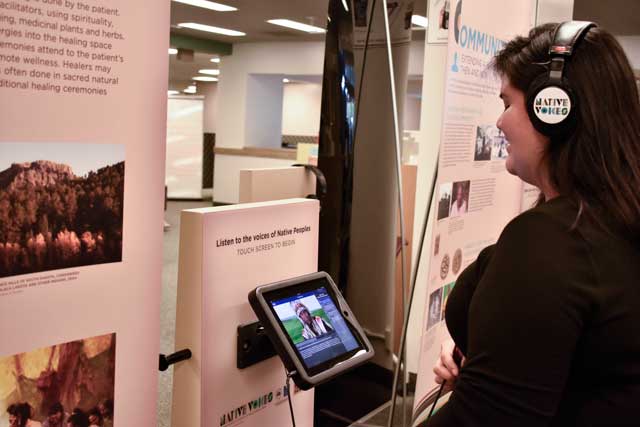
Native Voices: Native Peoples’ Concepts of Health and Illness is here through Wednesday, Nov. 20, during Native American Heritage Month, in the Library Lobby.
The exhibit includes interviews of Native people who, in the tradition of oral storytelling, discuss health and wellness through topic modules on six interactive iPads.
“The exhibit is important because it shares the story of what we in the society label as health, and it goes deeper to include and honor the role that community and culture play in supporting wellness for our tribal communities,” says Paula “Pimm” Tripp-Allen, academic advisor for Indian Tribal Education and Personnel Program (ITEPP), one of several campus groups sponsoring Native Voices. “Hearing the stories shared by the community leaders, traditional healers. and others provide not only a better understanding of health issues facing tribal communities, but also a lens to better understand our histories, our strengths, our survival, and how our view of wellness can be beneficial for all people.”
HSU was selected as one of only nine host sites in California and among 104 sites throughout the country to host the exhibit. Native Voices was developed by the U.S. National Library of Medicine in 2011 and displayed at the Library of Medicine in Maryland. Several members of HSU’s campus community have worked together since 2016 to bring Native Voices to HSU.
Native Voices is not only a conduit for non-Native people to understand the multifaceted experiences of Native people, but also a community builder because it attracts community members as well as HSU students, faculty, and staff.
The exhibit is especially relevant in Humboldt County. HSU sits in the northwestern portion of Wiyot ancestral territory and there are 11 federally recognized and unrecognized tribes, rancherias and sovereign tribal governments within HSU’s service area (Humboldt/Del Norte/Trinity Counties). These include Big Lagoon Rancheria, Blue Lake Rancheria, Elk Valley Rancheria, Hoopa Valley Tribal Council, Karuk Tribe of California, Resighini Rancheria, Bear River Band of Rohnerville Rancheria, Smith River Rancheria, Tolowa Nation, Trinidad Rancheria, Wiyot Tribe, and the Yurok Tribe.
“I hope the exhibit opens our students’ eyes to Native health and wellness,” says Kumi Watanabe-Schock, Library services specialist. “You can learn through exhibits and other peoples’ experiences.”